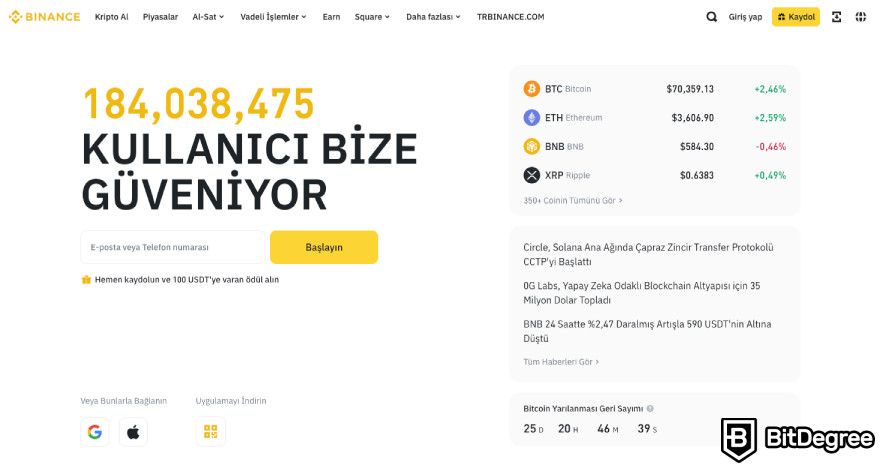Crypto Landscape in Turkey
So, is crypto legal in Turkey? Well, if it weren’t, I wouldn’t give you a list of the best crypto exchanges in Turkey. In fact, in recent years, the Turkey crypto exchange landscape has witnessed remarkable growth. So, let’s go a bit deeper into it.
First of all, it’s important to know that, as of writing, Turkey is in the process of developing crypto regulations. An "Unofficial Draft Legislation" is in the works, amending Capital Markets Law No. 6362, which will likely impose additional requirements on crypto asset service providers (CASPs) operating in Turkey. This legislation aims to regulate various aspects of crypto assets and CASPs within Turkish legislation.
Now, regarding how Turkey views cryptocurrencies, the Central Bank of Turkey has defined crypto assets as "intangible assets created virtually using distributed ledger or similar technologies, distributed over digital networks, and not qualified as money, registered money, electronic money, payment instruments, securities, or any other capital markets instruments."
Furthermore, according to the Regulation on the Disuse of Crypto Assets in Payments, the direct or indirect use of crypto assets as payment instruments is prohibited. However, the Central Bank of Turkey does not restrict their purchase, sale, offering, transfer, custody, or operation of crypto asset exchange platforms.

What’s more, the Central Bank Regulation has led to further obligations on CASPs within the scope of Law No. 5549 on the Prevention of Laundering of the Proceeds of Crimes, and the Financial Crimes Investigation Board has provided guidance regarding anti-money laundering and financing of terrorism for CASPs.
Now, when it comes to taxes, as of writing, Turkish tax laws do not address crypto assets, which leads to uncertainty. In 2020, a tax office suggested that crypto assets should be treated like commodities for inheritance and transfer tax purposes, but this lacks a solid legal basis.
Therefore, income generated from crypto assets may be subject to income tax, but there are no specific rules for this. Personal income taxation of crypto asset holdings is also not well-defined.
For corporate tax, how crypto assets are taxed depends on their classification as securities or commodities. Continuous trading is taxed as commercial income, while occasional gains are considered incidental.
Regarding value-added tax (VAT), it depends on how crypto assets are used. Exchanges for other currencies generally aren't subject to VAT, but commissions for certain services are taxable.

So, in short, Turkey is embracing the potential of cryptocurrencies, viewing them as an opportunity amidst economic challenges. The country aims to play a significant role in the digital revolution, evident through its development of a central bank digital currency, the digital Turkish lira[1].
A significant change happening worldwide is the growing global trend among national governments to bolster security within the crypto market through the implementation of laws and decrees aimed at preventing exploitation and cybercrimes.
To provide guidance to nations, the Financial Action Task Force (FATF) has established global regulations to address these issues. The FATF, an international organization focused on combating money laundering and terrorism financing, recognized cryptocurrency-related risks as early as 2014[2].
Anyway, now that you know where to buy Bitcoin in Turkey, and are familiar with Turkey’s crypto landscape, the last thing I want to do is discuss what makes a crypto exchange the best crypto exchange Turkey has to offer (in case you didn't find one in this list and plan to search yourself).
Best Crypto Exchange in Turkey: Evaluation Criteria
When it comes to finding the best crypto exchange in Turkey, there are several crucial factors to consider. These factors give us a complete picture of how well an exchange suits traders and investors. Let's take a closer look at them:
- Regulatory Compliance. The first and most important factor is ensuring that the exchange is operating within the legal framework of Turkey. This adds a layer of security to your trading experience, knowing that everything is on board.
- Security. Security is a significant concern in the digital world, and it’s no different when it comes to the Turkey crypto exchange sector. So, it's vital to choose an exchange that takes robust security measures. This includes encryption and multi-factor authentication to safeguard your assets from unauthorized access.
- Supported Coins. The variety of cryptocurrencies an exchange offers can greatly impact your trading options. An ideal Turkish crypto exchange should provide a diverse range of coins, including the Turkish Lira (TRY), allowing you to explore different investment opportunities.

- Fees. Fees can impact your profits, so understanding an exchange's fee structure is essential. The ideal exchange should have clear and competitive fees, helping you make the most of your earnings.
- Flexibility. Having various deposit and withdrawal methods makes it easier to manage your funds within the exchange. Look for options that offer flexibility to cater to your preferences.
- Usability. A user-friendly interface can significantly enhance your trading experience. The best crypto exchange in Turkey (or anywhere else) should offer an intuitive and easy-to-navigate platform, suitable for both beginners and experienced traders.
- Customer Support. Even with a user-friendly platform, questions and issues can arise. Therefore, a great Turkish crypto exchange should provide responsive customer support to address your concerns promptly and effectively.
By evaluating exchanges based on these criteria, you can confidently choose the best crypto exchange Turkey has to offer that aligns with your trading goals and preferences. Keep in mind that each factor contributes to an overall trading experience that should be secure, smooth, and rewarding.
Conclusions
In my quest to find the best crypto exchange in Turkey, I've taken a closer look at seven notable platforms, including big names like Binance, Bybit, and Kraken. As you can see, there are various reasons that make them suitable contenders for the title of the best crypto exchange Turkey traders can access.
But here's the real – the "best" exchange isn't a one-size-fits-all. It depends on what you're after, your trading goals, and how much risk you're willing to take. As the world of cryptocurrency keeps changing and growing, these exchanges, along with others, will likely keep getting better to serve Turkish traders even more effectively.
So, keep yourself informed, be cautious, and enjoy the adventure of trading in the exciting realm of cryptocurrencies.
































